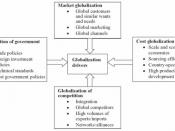Global Business � PAGE �1�
Running Head: GLOBAL BUSINESS
The Rise of Globalization
Globalization is defined by JatuliaviÃÂienÃÂ & KuÃÂinskienÃÂ (2006) in three different sections. First is the economic globalization which was associated with political globalization. Under the economic globalization, democratic, market-driven and open economies provide opportunities that will respond to the global challenges. It will be further developed through technological globalization wherein the rapid diffusion of free enterprises is accelerated by means of advance technology and new ways of communication. Indeed, new opportunities are essentially comes from advances in computer technology. And together, this economical, political and technological globalization initiates another concept which is the psychological globalization. With psychological globalization, relationships between participating countries are deepened, while at the same time, interdependence among people from these countries is broadened.
International trade started as early as seventeenth century. As discussed by Dominick Salvatore (2001), Adam Smith established trading based on the law of absolute advantage.
Initially, it was deemed that for two nations to trade with each other voluntarily, both nations must gain. That is, when each nation specializes in producing the commodity of its absolute advantage and exchanges part of it for the commodity of its absolute disadvantage, then both nations would wind up consuming more of both commodities. However, absolute advantage describes only a small portion of the contemporary international trade, particularly that of the trade between developed and developing countries. Trade among developed countries could not be explained by absolute advantage, thus David Ricardo, with the law of comparative advantage, further explain the basis for and the gain from trade. The law of comparative advantage postulates that even if one nation is less efficient that the other nation in the production of both commodities, mutual benefit from trade is still possible. It will be attained if the...


